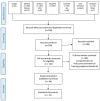International Standards for Dementia Workforce Education and Training: A Scoping Review
- PMID: 37071967
- PMCID: PMC10825835
- DOI: 10.1093/geront/gnad023
International Standards for Dementia Workforce Education and Training: A Scoping Review
Abstract
Background and objectives: The increasing number of people with dementia requires transparency and quality dementia education, training, and care. This scoping review aimed to determine the key elements of national or state-wide standards on dementia education and training that could underpin the development of international standards for dementia workforce training and education.
Research design and methods: The English-language peer-reviewed and gray literature were searched (2010-20). Key search domains were training, workforce, standards/frameworks, and dementia.
Results: Thirteen standards were identified from the United Kingdom (n = 5), the United States (n = 4), Australia (n = 3), and Ireland (n = 1). Most standards focused on training health care professionals with some including people in customer-centric settings, people living with dementia, and informal carers or the general community. Seventeen training topics were identified in 10 or more of the 13 standards. Cultural safety, rural issues, health care professional self-care, digital literacy, and health promotion topics were less commonly reported. The barriers to standards implementation were lack of organizational support, lack of access to relevant training, low staff literacy, lack of funding, high staff turnover, ineffective past program cycles, and inconsistent service delivery. Enablers included a strong implementation plan, funding, strength of partnerships, and building on previous work.
Discussion and implications: The U.K. Dementia Skills and Core Training Standard, the Irish Department of Health Dementia Together, and the National Health Services Scotland Standard are the recommended strongest standards for underpinning the development of international standards. It is essential that training standards are tailored to the needs of the consumer, worker, and regions.
Keywords: Aged care; Education; Policy; Standards; Workforce.
© The Author(s) 2023. Published by Oxford University Press on behalf of The Gerontological Society of America.
Conflict of interest statement
S. W. Pit declares an interest in work, health, and aging and standardization practices as part of Work Wiser International. The authors have received part funding to conduct the work as listed above. No other conflict of interests are declared.
Figures
References
-
- Abley, C., Dickinson, C., Andrews, Z., Prato, L., Lindley, L., & Robinson, L. (2019). Training interventions to improve general hospital care for older people with cognitive impairment: Systematic review. British Journal of Psychiatry: The Journal of Mental Science, 214(4), 201–212. doi:10.1192/bjp.2019.29 - DOI - PubMed
-
- Alzheimer’s Association and Centers for Disease Control and Prevention. (2018). Healthy brain initiative, state and local public health partnerships to address dementia: The 2018–2023 road map. https://www.cdc.gov/aging/pdf/2018-2023-Road-Map-508.pdf
-
- Alzheimer’s Disease Association Singapore. (2020). Academy courses. https://alz.org.sg/artc/courses/
Publication types
MeSH terms
Grants and funding
LinkOut - more resources
Full Text Sources
Medical
Miscellaneous


